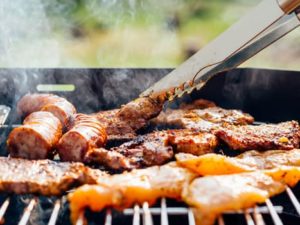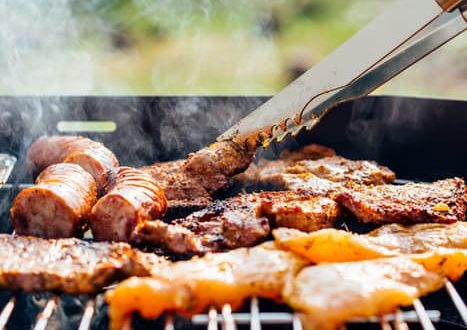Read more Oily Rag articles By Frank and Muriel Newman
Happy New Year! It’s summer and for many that means dusting off the BBQ. Some BBQs have more gadgets and style than a Lear Jet but that’s not really the oily rag way.
There is no doubt that the BBQing community is divided between charcoal and gas. Most oily raggers are of the charcoal persuasion – it costs nothing to make a wood burning BBQ, and the smoky taste is a bonus. Oily rag BBQs are more likely to be a hot plate and grill supported by a few demolition bricks or blocks. Flashy BBQs are not really the kiwi way – it’s more the thing you would see on show near the blunt end of a super yacht in the Auckland viaduct than in the backyard of the frugally happy!
Oily raggers have a fair bit to say about BBQs and it’s not an exaggeration to say some consider BBQing to be one of those elusive art forms that can never quite be perfected.
The secret to a good BBQ is in the preparation and the cooking. The preparation starts by preheating your BBQ for about 15 minutes for gas and about 30 minutes for charcoal. Meat usually features large in the BBQ menu so here are some tips:
 Most meat should be cooked on high heat. Use medium heat for meats that cook more quickly, like chicken.
Most meat should be cooked on high heat. Use medium heat for meats that cook more quickly, like chicken.
- Make sure that all your meat is at room temperature before cooking. It will help it to cook evenly.
- Marinating the meat in a sauce using the likes of red wine, soy sauce, or vinegar will add flavour and tenderise, and should be done at least half an hour before cooking.
- BBQ cooking would not be fair dinkum without sausages. If they have been pre-cooked it’s just a matter of re-heating and browning. As a dash of style, why not try skewers – but more on that later.
After the meat come the vegetables.
- Olive oil is good for cooking vegetables but use a low or medium heat because it can burn.
- An oily ragger from the Far North says they make a vege food parcel by wrapping mixed vegetables (mushrooms, carrots, small potatoes, and so on) together in tin foil. The important thing is to add a squeeze of lemon before sealing. The lemon juice steams the vegetables and gives the package its flavour.
Freshly caught fish on the barbecue is an icon of summer holidays. Although the fish may be cooked as fillets or wrapped in foil, the ‘purist’ way is to cook the fish whole after gill-gutting (it’s just not the same if the eyes and head aren’t intact!).
- To barbecue a whole fish, grease the grill plate well. Slash the skin so that the heat penetrates through to the flesh. Baste often with lemon juice and a little melted butter or oil. Blokes will often combine basting and boasting in a single function. This is to be encouraged so as to retain the chef’s interest in the task at hand – and perhaps extend the interest to include the dishes! A whole fish takes approximately 10 minutes – longer if the boasting becomes tedious.
- For those who do wish to be practical about the fish-on-the-barbecue ritual – and those who prefer their fish cooked not burnt – try wrapping the fillets in foil. Dot with butter, season with salt and pepper and add a squeeze of lemon juice. Wrap up and place on barbecue for about 5 minutes.
And as a final touch for a dash of style – and to make people think you really do know what you are doing – try skewers.
- Soak skewers for at least 15 minutes but preferably 30 minutes before using on the BBQ.
- To make sausage à la kebab you need sausages chunks and the bits that go between: button mushrooms (whole or half), cherry tomatoes, sliced peppers (red for a sweet taste), pineapple chunks (not lumps!), zucchini… Barbecue until cooked – which will only take about 5 minutes – turning often. Simply change the meat – meat chunks, mince balls, shellfish, prawns, satay chicken pieces – and you have a new type of kebab!
- A reader says they make a mince patty mix (mince, egg, onion, herbs, garlic) which they shape into long thin sausages which are skewered through their length. They are quick to cook and easy to eat.
Have lemon wedges available for your guests to squeeze on as a dressing.
One final safety message: Make sure you wear the right protective gear when BBQing. Naturalist BBQing may be hazardous!
Happy holidays around the BBQ.
Do you have a favourite oily rag summer tip? If so, please send it to us at www.oilyrag.co.nz or write to Living off the Smell of an Oily Rag, PO Box 984, Whangarei.
* Frank and Muriel Newman are the authors of Living Off the Smell of an Oily Rag in NZ. Readers can submit their oily rag tips on-line at www.oilyrag.co.nz. The book is available from bookstores and online at www.oilyrag.co.nz.








Join the Discussion
Type out your comment here:
You must be logged in to post a comment.